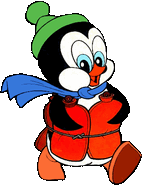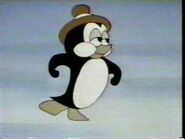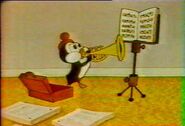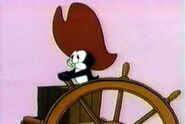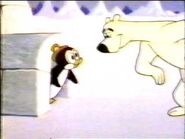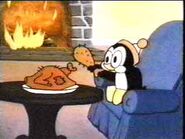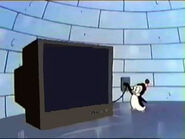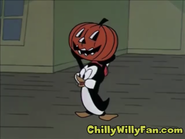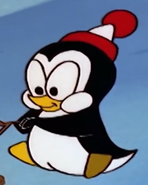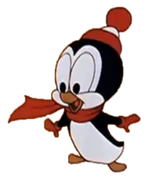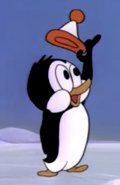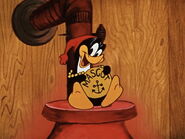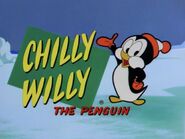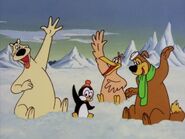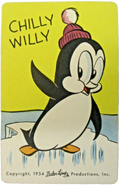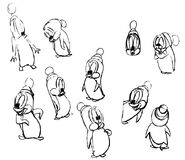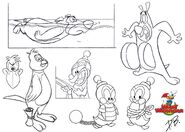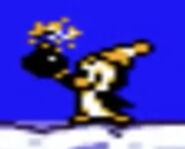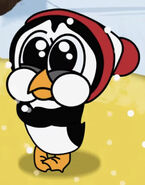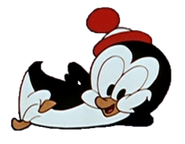Chilly Willy is a cartoon character, a diminutive anthropomorphic penguin living in Fairbanks, Alaska, although the species is native only to the southern hemisphere. He was created by Paul J. Smith for the Walter Lantz studio in 1953. The character soon became the second most popular Lantz/Universal character, behind Woody Woodpecker.
Inspiration[]
Chilly Willy was inspired, according to Scott MacGillivray's book "Castle Films: A Hobbyist's Guide," by mystery writer Stuart Palmer. Palmer used the Lantz studio as a background for his novel "Cold Poison," in which the cartoon star was a penguin character, and Lantz adopted the penguin idea for the screen. Chilly's diminutive figure was inspired by an image of Herbert Lee McCormick Jr., a small boy from Fairbanks. His name suggests the film actor Chill Wills.
Plot[]
Chilly Willy appeared in 50 theatrical short subjects produced by Lantz from 1953 to 1972, most of which involve his attempts to stay warm, and always meeting opposition from a dog named Smedley (voiced by Daws Butler in his "Huckleberry Hound" voice). There were times, however, when Chilly and Smedley got along, as they did in Vicious Viking and Fractured Friendship. Ironically, Chilly never referred to Smedley by name. Most times that Chilly was in opposition with Smedley, it wound up with the two of them being friends at the end. Chilly was more of a nuisance to Smedley than an enemy, often showing up where Smedley is working, usually for some mean employer.
Two of Chilly's friends in the later seasons of the show were Maxie the Polar Bear (voiced by Daws Butler) and Gooney the "Gooney Bird" Albatross (voiced by Daws Butler impersonating Joe E. Brown). Maxie has appeared with Chilly more than Gooney has. There has been only two cartoons in which all three characters have appeared together: Gooney's Goofy Landings (where Chilly and Maxey try to perfect Gooney's landings) and Airlift a la Carte (where Chilly, Maxie, and Gooney go to the store owned by Smedley).
In some episodes, Chilly Willy also deals with a hunter named Colonel Pot Shot (voiced by Daws Butler) whom Smedley has been shown to work for in some episodes. Pot Shot would give orders in a calm controlled voice, and then would explode in rage when he told Smedley what would happen should he fail in his objective. Also, two episodes had Chilly Willy outsmarting Wally Walrus when Chilly Willy comes across his fishing projects.
Chilly has a great fondness for pancakes.
Paul J. Smith directed the first Chilly Willy cartoon, simply titled Chilly Willy, in 1953. The initial version of Chilly Willy resembled Woody Woodpecker, except with flippers and black feathers, but in subsequent cartoons an entirely new design was used.
Tex Avery revived the character for two of his most notable shorts, I'm Cold (1954) and the Academy Award nominated The Legend of Rockabye Point (1955). After Avery left the studio, the Chilly cartoons were directed by Smith and Alex Lovy, with some 1960's cartoons directed by Jack Hannah and Sid Marcus.
Chilly was mute in most of his 1950s and early 1960s cartoons, although he was voiced by Sara Berner in the initial entry, while later entries featured Daws Butler providing Chilly's voice, in a style similar to his Elroy Jetson characterization. The character always speaks in the comic book stories based on the character. Also in the comic book stories (like Knothead & Splinter) Chilly had two nephews named Ping and Pong.
When the Lantz cartoons were packaged for television in 1957 as The Woody Woodpecker Show, Chilly Willy was a featured attraction on the show, and has remained such in all later versions of the Woody Woodpecker Show package.
Pop Culture references[]
In the 1988 film Who Framed Roger Rabbit, Chilly Willy is mentioned by Eddie's acquaintance Angelo. Originally, Chilly was going to made a physical cameo appearance in that film.
Theme Song[]

Chilly willy theme song
Walter Lantz created Chilly Willy's famous opening with the ice phone invention. The clips was loaded from the cartoon Pesky Pelican and the audio from Hot and Cold Penguin.

